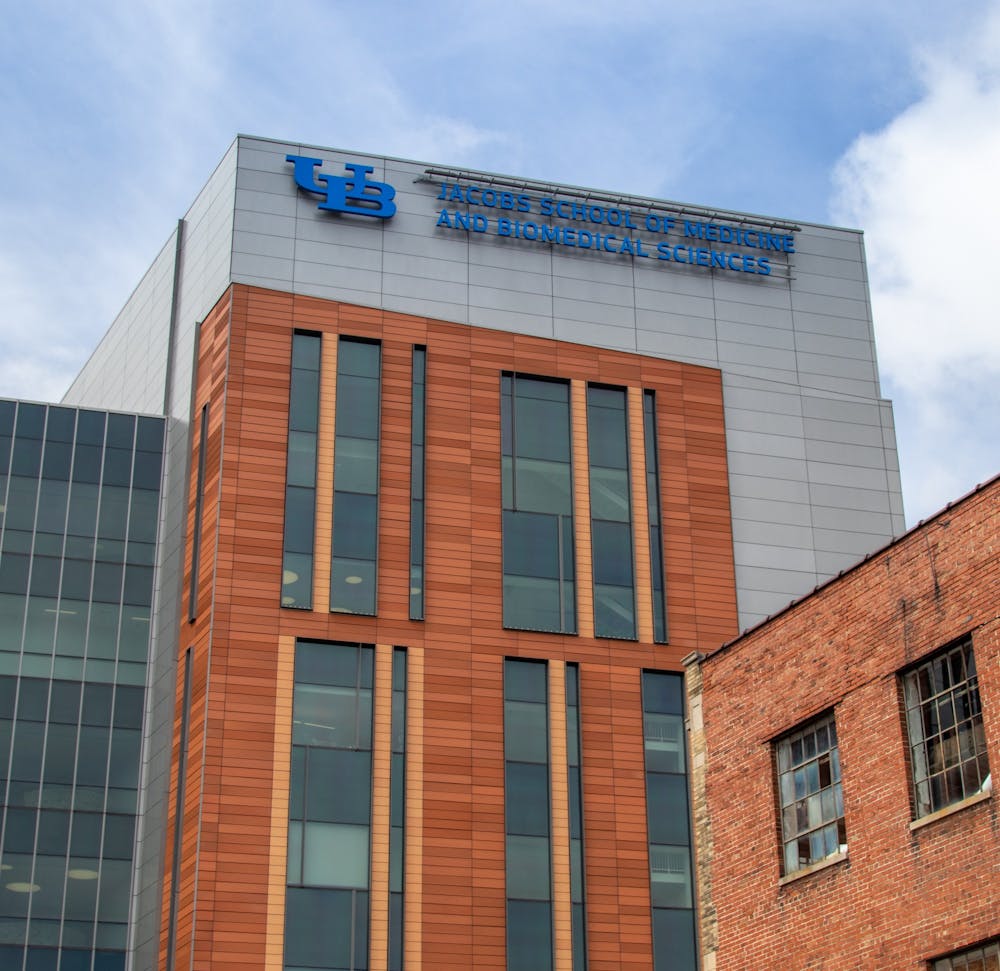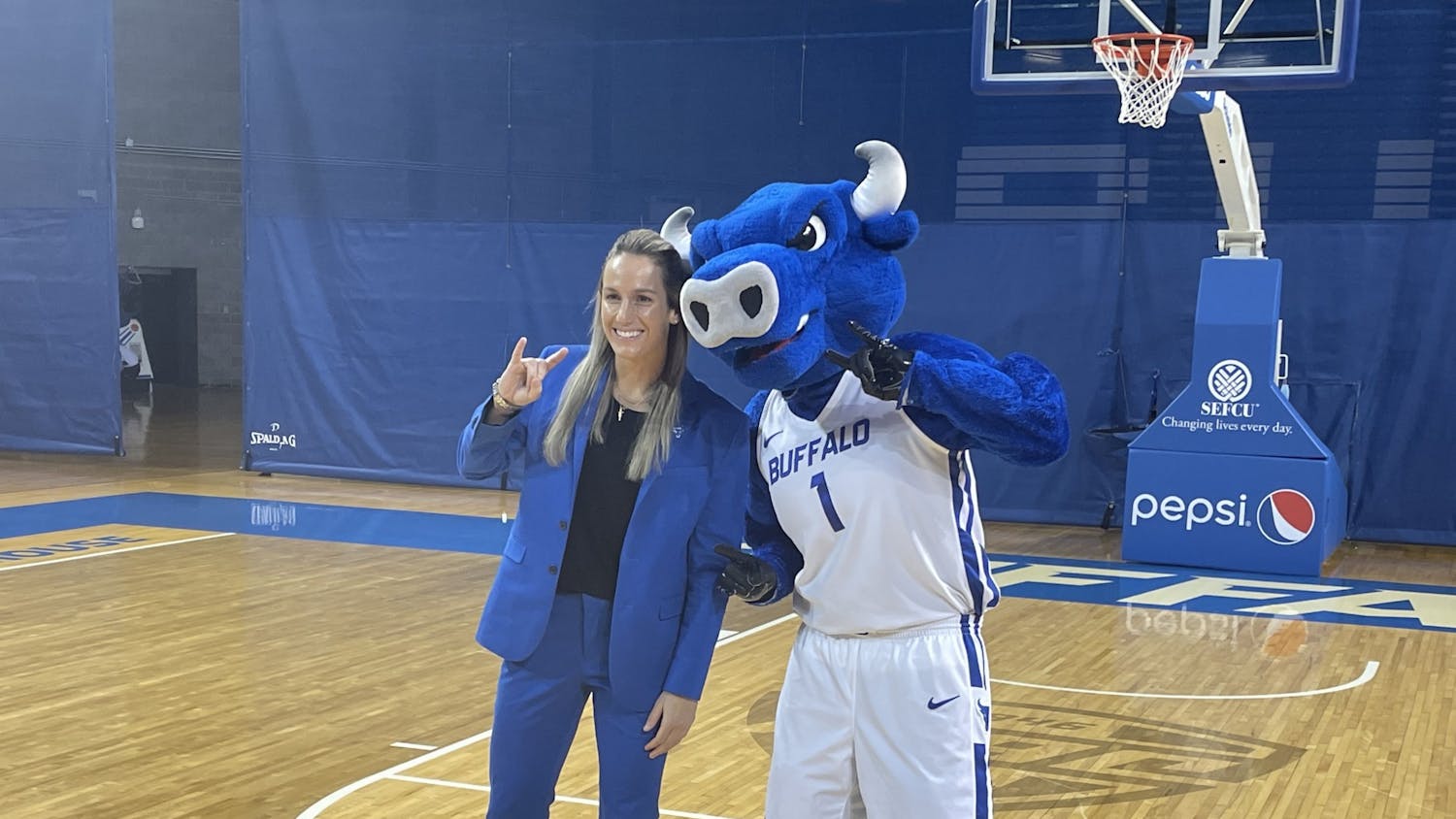Almost two months after filing for a unionization vote, pro-union medical residents and fellows — speaking to The Spectrum for the first time — say they are “very confident” that a “supermajority” of their colleagues at UB-affiliated medical facilities are in favor of unionizing.
Dozens of frontline workers gathered last Friday to voice support for the unionization effort and share stories of how patient care is suffering at UB-affiliated hospitals.
Ballots were sent to eligible employees on March 1, according to organizers’ website. Votes will be counted on May 11 at Buffalo’s National Labor Relations Board (NLRB) office.
If approved, the union would cover all 810 UB-affiliated medical residents, fellows and interns under the Union of American Physicians & Dentists (UAPD). UAPD is a Sacramento, California-based union that represents doctors and other healthcare workers across the country.
“The Jacobs School of Medicine and Biomedical Sciences at UB is committed to providing outstanding educational opportunities for our residents and fellows. These physicians inspire us every day with their dedication, compassion and clinical skills,” the Jacobs School of Medicine said in a statement to The Spectrum. “At all times, the graduate medical education programs at UB strive to optimize the outcomes for our patients, their families and our communities, at the same time working to enhance the clinical learning environment for the benefit of our residents and fellows.”
Dr. Armin Tadayyon, a second-year anesthesiology resident who’s helped with the unionization effort, said that “higher wages” are a top priority for the would-be union. He added that any negotiations would be based on a “collective agreement of what’s important” to members.
Pro-union residents and fellows said on their website they make less than their colleagues at other Western New York universities. Fellows and residents at the University of Rochester, for instance, get a limited tuition waiver, retirement benefits, housing stipends and childcare benefits in addition to higher wages.
The Jacobs School says that organizers’ data doesn’t “reflect the vastly different benefit packages offered at the different upstate institutions.” UB, for example, pays for residents and fellows’ medical and dental insurance in full, while the University of Rochester simply subsidizes their employees’ policies.
“One thing that University of Buffalo lacks when it comes to other programs is the financial support,” Tadayyon said. He added that residents work 80-hour work weeks and make “about $13 and some change” per hour.
Aside from perceived underpayment, Tadayyon also cited complaints of substandard working conditions at some UB-affiliated hospitals.
“It’s a requirement to have call rooms for people who are in the hospital for 24 hours for a place to sleep. We have that, but the call room hasn’t been cleaned in over a month,” Tadayyon said. “I can’t find any new bed sheets, I can’t find any pillows. I mean, I had to create a huge ruckus in order to just get a brand new mattress there because our mattress and our box springs were broken.”
Dr. Frank Massaro, a first-year anesthesiology resident, says that the UB administration “takes advantage” of residents and fellows’ loyalty to Buffalo and mission to practice medicine.
Residency programs are binding agreements that place recent medical school graduates in a medical practice at a hospital or university. Residents often don’t have the resources or ability to switch programs.
Massaro explains that a “learned helplessness” has taken place, making people “willing to put their heads down,” leading to a culture of complacency.
“There’s a lot of people here at this residency program that are from Buffalo, they have done literally everything they can to stay in the area,” Massaro said. “There’s so much loyalty here.” He adds that when residents have attempted to bargain for these accommodations individually, their efforts have “gone nowhere.”
Tadayyon said there has been a lot of anti-union communications that has come through the graduate medical education (GME) Listserv. Letters have been sent to voters, stating they came from “concerned residents.”
“The only way it could come from a concerned resident or come through a Listserv as GME is if it was approved by administration,” Tadayyon said.
He added that pro-union emails were “filtered out and not sent.”
Massaro added that those who oppose a union do so “out of fear of repercussions for being a part of a movement.” For that reason, he says organizers have emphasized that the union vote is an “anonymous process.”
UB residents and fellows received a 3% pay raise at the beginning of 2023 and will receive another 3% pay raise in July, according to the Jacobs School.
“These sequential pay raises were negotiated in lieu of the previously negotiated 2% overall raise,” the school’s statement said.
UAPD President Stuart Bussey told The Spectrum in March that the higher raises were designed to convince employees that they don’t need a union.
“If you support the workers, those people are going to turn around and serve the community better,” Massaro said. “That’s why I feel it’s important to get to be a part of this because the city of Buffalo deserves it, the people of Buffalo deserve it, and we deserve it.”
Editor's note: This article has been updated to correct the spelling of Armin Tadayyon's name.
Suha Chowdhury is an assistant news editor and can be reached at suha.chowdhury@ubspectrum.com
The news desk can be reached at news@ubspectrum.com





